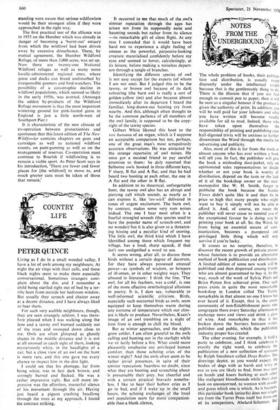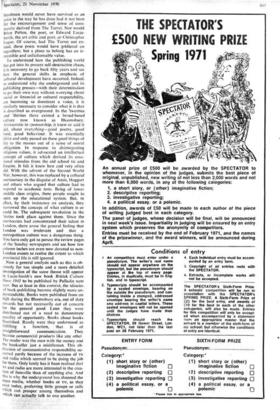The whole problem of books, their publica- tion and distribution,
is usually swept discreetly under the intellectual carpet because that is the gentlemanly thing to do.
There is the illusion that if you are fool enough to commit pen to paper, then it will be seen as a singular honour if the product is given theauthority of print. In addition, you will be well paid for your labours and what given theauthority of print. In addition, you will be well paid for your labours and what you have written will become readily available for all to read. Indeed, those who have taken upon themselves the responsibility of printing and publishing your half-digested trivia will be anxious to further disseminate the Word through the media for advertising and publicity.
Alas, most of this is far from the truth as almost anyone who has ever written a book will tell you. In fact, the publisher will give the book a misleading dust-jacket, rely on opinionated sales representatives to decide whether or not your book is worthy of distribution, depend on the taste or the lack of it of the bookshop owner or the near- monopolist like W. H. Smith, forget to publicise the book because the Sunday Times didn't quite like it and then fix its price so high that many people who might want to buy it simply will not be able to afford it. And, of course, en route the publisher will never cease to remind you of the exceptional favour he is doing you by printing your book at all. So, the Word, far from being an essential means of com• munication, becomes a pampered and privileged little thing which will only survive if you're lucky.
It comes as no surprise, therefore, to discover the recent growth of private presses whose function is to provide an alternative method of book publication and distribution. A limited edition of some new work will be published and then dispensed among friends who are almost guaranteed to buy it. In this way, much of the work of Sylvia Plath and Brian Patten first achieved print. One such press exists in quite the most remarkable bookshop in London called The Turret, remarkable in that almost no one I know has ever heard of it. Except, that is, the entire community of non-Establishment poets who congregate there every Saturday afternoon to exchange news and views and drink a glass of wine. And remarkable in that it has broken down the barriers between writer, publisher and public, which the publishing industry proper has created. The other evening, for example, it held a party to celebrate, and I think celebrate is exactly the right word, to celebrate the publication of a new collection of cartoons by Ralph Steadman called Dogs Bodies. The drawings depict, as you would expect. the bodies of dogs with as harsh and witty an eye as you are likely to find, from two men on hands and knees barking at each other like malignant bloodhounds while their dogs look on unconcerned, to woman with poodle and guess which one is which. As it happens, this particular book (price8s) does not origin- ate from the Turret Press itself but from one of its competitors, Abelard-Schuman. But
Steadman would never have survived as an artist in the way he has done had it not been for the encouragement and sense of com- munity derived from The Turret. Nor would Brian Patten, the poet, or Edward Lucie- Smith, the art critic and poet, or Christopher Logue. Of course, had The Turret not ex- isted, these poets would have soldiered on regardless; but a place to belong has an ir- resistible and unfathomable value.
To understand how the publishing world has got into its present self-destructive chaos, it is necessary to go back fifty years and see how the general shifts in emphasis of cultural development have occurred. Indeed, to understand why the underground and its publishing presses—with their determination to eo their own way without worrying about social or financial or cultural respectability, are becoming so dominant a voice, it is similarly necessary to consider what it is that is described as overground. In the 'twenties and 'thirties there existed a broad-based culture now known as Bloomsbury. Aristocratic in sponsorship, it knew or said it did, about everything—good poetry, good food, good behaviour. It was essentially elitist and only passed on these good things of life to the masses out of a sense of moral obligation. In response to disintegrating religious values, it advocated an intellectual concept of culture which derived its emo- tional stimulus from the old school tie and Empire. It felt it knew best and very often did. With the advent of the Second World War, however, this was replaced by a cultural meritocracy in the disguise of Amis, Hoggart and others who argued that culture had to respond to academic tests. Being of lower middle class origins, these people sought to open up the educational system. But, in effect, by their insistence on analysis, they narrowed the concept of what culture is or could be. The subsequent revolution in the 'sixties took place against them. Since the meritocrats had concentrated their talent in London, there arose the general feeling that London was irrelevant and that a metropolitan culture was a dangerous thing. You have only got to peruse the review pages of the Sunday newspapers and see how few column inches are even now devoted to non- London events to realise the extent to which provincial life is still ignored.
Now a general analysis such as this is ob- viously far too simple and a more detailed investigation of the same theme will appear in Lucie-Smith's new book British Culture Since 1945 to be published by Palladin next sear. But at least in this context, the idiocies of hook-publishing become slightly more un- derstandable. Books were published from on high during the Bloomsbury era, out of duty wards but not necessarily out of concern for the general good. Later they were distributed out of a need to demonstrate equality of opportunity. Books about books flourished. Rarely were they understood as fulfilling a function, that is of
straightforward communication. They became commercial products like any other. The reader was the man with the money and the bookseller just a middleman. This ab- dication of communicative responsibility oc- curred partly because of the increase of -ry and radio which seemed to be doing the job for them. Only lately has it been realised that Tv and radio are more interested in the crea- tion of funsville than of anything else. And this is why the underground has shunned the mass media, whether books or -rv, as they exist today, preferring little groups or cells which can prosper among themselves and which can actually talk to one another.















































 Previous page
Previous page